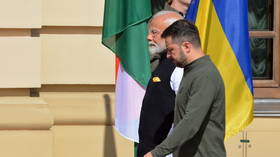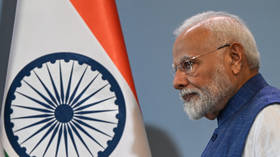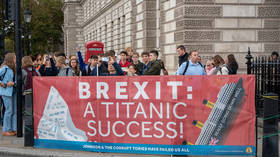Ukraine wants Modi to help strike peace deal – Politico

Ukraine sees India and its prime minister, Narendra Modi, as the best choice to broker a peace agreement with Moscow that Kiev “can live with,” a high-ranking official has told Politico.
Ever since Modi visited both Russia and Ukraine to discuss the conflict with the countries’ leaders, Kiev has come to “increasingly view” New Delhi as its intermediary in “dealings with the Kremlin,” the outlet wrote, citing the unnamed Ukrainian official.
The report comes a day after Zelensky and Modi met during the UN ‘Summit of the Future,’ held as part of the annual General Assembly session in New York.
The two leaders have met several times in recent months – in June at the G7 Summit in Italy, and in Kiev last month, just weeks after Modi travelled to Moscow for talks with Russian President Vladimir Putin.
July's India-Russia summit was closely watched by the West and was openly criticized by Zelensky, who at the time suggested Modi’s trip to Moscow was “a blow to peace efforts.”
His remarks did not go down well in New Delhi, which summoned the Ukrainian envoy. The Indian government also objected to Zelensky’s subsequent remarks, after his meeting with Modi in Kiev, according to former diplomats and foreign policy experts.
Zelensky told reporters that India could be considered a host for the next ‘peace summit’ if it signs the communique that emerged from the first such event – hosted by Switzerland in June. The Indian delegation attended, but refused to associate itself with the final document – noting that it did not feature Russia, a condition India considers vital for any “serious” attempt at ending the conflict.
Commenting on the details of Modi’s latest discussions with Zelensky, Indian Foreign Secretary Vikram Misri on Tuesday told the media that the talks focused on conflict resolution. However, he noted that “we are not right now at a stage where the second peace summit can be discussed in any detail.” He added there is “lot of work that remains to be done before that.”
Later on Tuesday, Indian Foreign Minister S. Jaishankar clarified that while India doesn’t have a “peace plan” to resolve the Ukraine conflict, it does engage in dialogue with both Moscow and Kiev, something that “not many countries or leaders” do. He also stressed that “at some point, there has to be negotiations, and it obviously has to include both parties; it cannot be one-sided.”
Meanwhile, addressing the UN Security Council on Tuesday, Zelensky said he has invited India – along with China, Brazil and other countries – to join preparations for a second “peace summit.”
He also insisted that the conflict “cannot be calmed by talks” and that “Russia can only be forced into peace.” Moscow dismissed the remarks, calling Zelensky “delusional.”
Zelensky’s proposed ‘victory plan’ – which could supposedly end the conflict with Moscow by the end of the year – has not been disclosed in full. However, reports indicate that it includes, among other points, Western security guarantees akin to NATO’s collective defense, and a continuation of Ukrainian incursions into Russia’s Kursk region as a territorial bargaining tactic. Zelensky earlier told ABC News that the plan is focused on strengthening Ukraine rather than negotiating with Russia.













